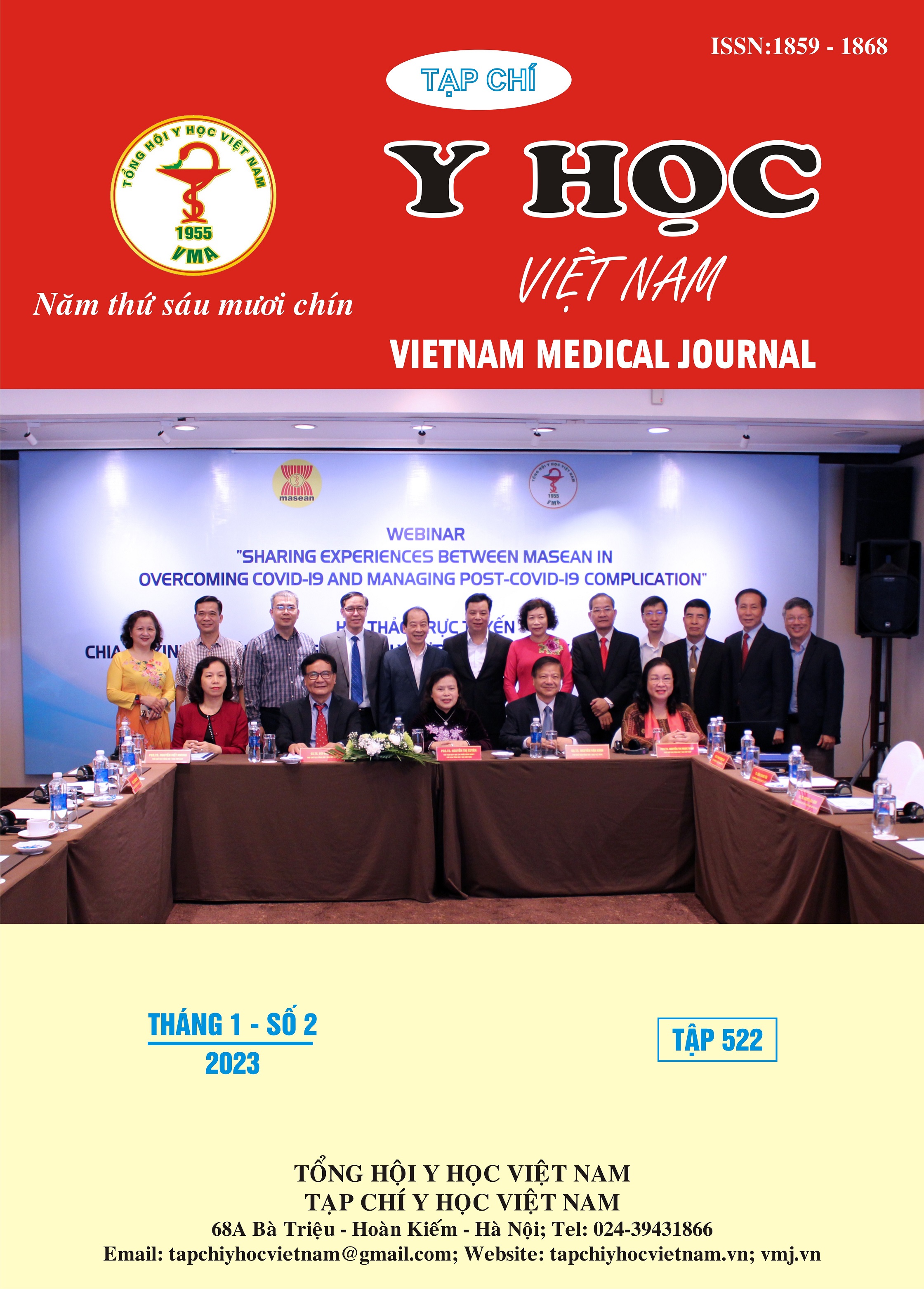CLINICAL, PARACLINICAL FEATURES AND IDENTIFICATION OF EGFR-T790M MUTATIONS CAUSING FIRST-GENERATION EGFR-TKIS RESISTANCE IN PATIENTS WITH NON-SMALL CELL LUNG CANCER BY USING LIQUID BIOPSY
Main Article Content
Abstract
Objectives: To investigate clinical and laboratory characteristics to determine the status of EGFR-T790M mutations causing first-generation resistance to EGFR-TKIs in patients with non-small cell lung cancer by liquid biopsy technique. Subjects: Including 31 patients diagnosed with EGFR-mutated non-small cell lung cancer (+) who received first-step treatment with first-generation EGFR-TKIs, and had liquid biopsies for EGFR-T790M mutations. Result: The study patients were mainly over 60 years old (64.5%) in which the male: female ratio was approximately equal; up to 58.1% of the patients did not smoke. The mean time of emergence of resistance to 1st generation TKIs: 11.9 ± 3.4 months (ranged from 7-20 months). Fatigue (96.8%) and weight loss (87.1%) were systemic symptoms accounting for the highest proportion. Chest pain (77.4%) was the most common respiratory symptom; hemoptysis (12.9%) was the least common. The number of patients with tumor sizes from 2-3cm is the highest, accounting for 32.3%, up to 9.7% of patients with tumor size >7cm. EGFR-T790M mutations detected by liquid biopsy method was 35.5%; up to 64.5% of patients had advanced disease, but liquid biopsy results did not have EGFR-T790M gene mutations. Median progression-free survival between the group carrying the EGFR-T790M mutation (11.82 months; 95% CI 9.22-14.42) and the group not carrying the EGFR-T790M mutation (11.95 months); 95%CI 10.44-13.46) there was no statistically significant difference. Conclusion: The rate of patients with EGFR-T790M mutation by liquid biopsy is somewhat higher than in other studies worldwide. No factors affecting the occurrence of EGFR-T790M mutations have been recorded, nor have they been recorded for this mutation.
Article Details
Keywords
EGFR-T790M, non-small cell lung cancer, EGFR-TKI
References
2. Travis WD, Brambilla E, Nicholson AG, et al. The 2015 World Health Organization Classification of Lung Tumors: Impact of Genetic, Clinical and Radiologic Advances Since the 2004 Classification. J Thorac Oncol. Sep 2015;10(9):1243-1260. doi:10.1097/JTO.0000000000000630
3. Pallis A, Serfass L, Dziadziuszko R, et al. Targeted therapies in the treatment of advanced/metastatic NSCLC. European journal of cancer. 2009;45(14):2473-2487.
4. Jenkins S, Yang JC, Ramalingam SS, et al. Plasma ctDNA Analysis for Detection of the EGFR T790M Mutation in Patients with Advanced Non-Small Cell Lung Cancer. J Thorac Oncol. Jul 2017;12(7):1061-1070. doi:10.1016/j.jtho.2017.04.003
5. Wang Z-F, Ren S-X, Li W, Gao G-H. Frequency of the acquired resistant mutation T790 M in non-small cell lung cancer patients with active exon 19Del and exon 21 L858R: a systematic review and meta-analysis. BMC cancer. 2018;18(1):1-7.
6. Kim H-R, Lee JC, Kim Y-C, et al. Clinical characteristics of non-small cell lung cancer patients who experienced acquired resistance during gefitinib treatment. Lung Cancer. 2014; 83(2):252-258.
7. Oxnard GR, Arcila ME, Sima CS, et al. Acquired resistance to EGFR tyrosine kinase inhibitors in EGFR-mutant lung cancer: distinct natural history of patients with tumors harboring the T790M mutation. Clinical cancer research. 2011;17(6):1616-1622.
8. Oya Y, Yoshida T, Kuroda H, et al. Association between EGFR T790M status and progression patterns during initial EGFR-TKI treatment in patients harboring EGFR mutation. Clinical lung cancer. 2017;18(6):698-705. e2.


